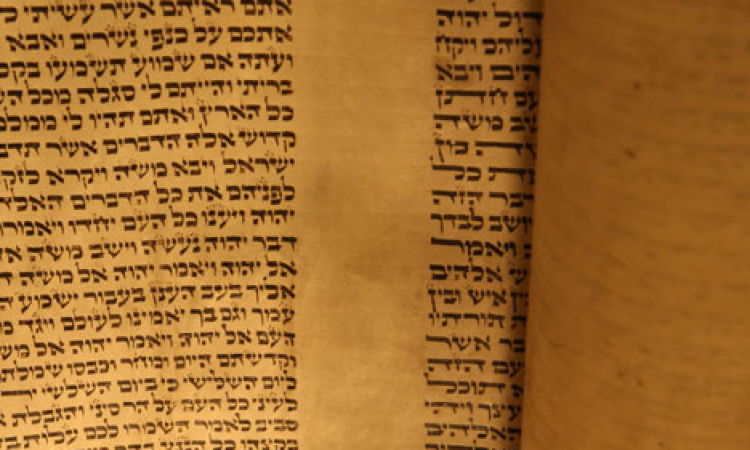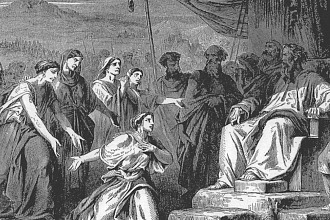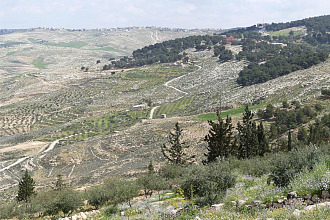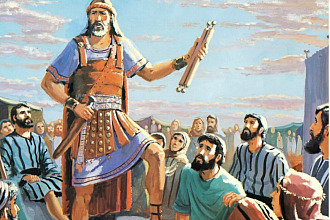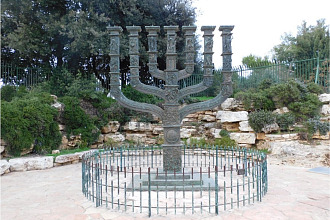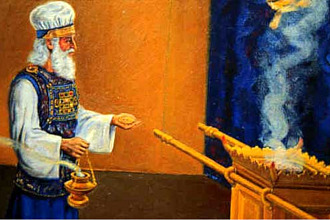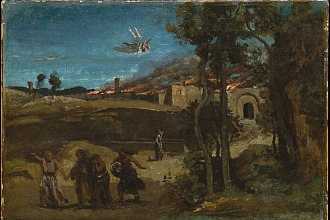Parasha for the Week: Vaetchanan Deuteronomy 3:23 – 7:11
Haftarah for the Week: Isaiah 40:1 - 20
Apostolic Writings: Romans 7:7 - 20
Overview:
We always read Parashat V’etchanan on the Shabbat after the fast of the 9th of Av—a Shabbat known as Shabbat Nachamu, the “Shabbat of Comfort.”
We always read Parashat V’etchanan on the Shabbat after the fast of the 9th of Av—a Shabbat known as Shabbat Nachamu, the “Shabbat of Comfort.” After the fast of Tisha BeAv we need to be comforted, that is why on this Shabbat we read the Haftarah from Isaiah (chapter 40) which is the source of its name: “Comfort, comfort My people,” says your G-d. Speak to the heart of Jerusalem and proclaim to her that her time has been fulfilled, that her iniquity has been conciliated, for she has received from the hand of G-d double for all her sins.” (Isaiah 40:1-2)
This message of comfort is a prophecy concerning the redemption, and assures Israel that the destruction and their sufferings are merely a temporary phenomenon in the context of an eternal covenant. G-d is forgiving the sins of Israel.
Our Parasha offers comfort of a deeper sort, a comfort that is also based on the world of the present and does not have to await the coming of the Messiah. Let’s remember that there will be a time when the kingdom of G-d, coming from heaven will be established for eternity (Dan 2:44), but the kingdom of G-d can be experienced today. That is why Rabbi Shaul said “for the Kingdom of G-d is not eating and drinking, but righteousness, peace, and joy in the Holy Spirit.” (Rom 14:17).
On Tisha Be’av, the Jewish people mourn the destruction of the Temples because they represent the departure of the Shechina, G-d’s Presence, in the world. But, in a way, G-d’s Presence is still among us through His Word. We know the will of G-d through His Word, and secondly by the Ruach Hakodesh (Spirit of Hashem) the true comforter offered by Yeshua. He promised “If you love me, you will keep my commandments. And I will ask the Father, and he will give you another Helper, to be with you forever,” (John 14:15–16).
Although Moshe is glad that Yehoshua will lead the nation, Moshe nevertheless prays to enter the Land of Israel in order to enjoy the promise land after the last forty years of hard work. Hashem refuses.
Moshe reminds Israel of the gathering at Sinai when they received the Torah—that they saw no visual representation of the Divine, but only the sound of words.
Moshe impresses on the people of Israel that the Sinai revelation took place before an entire nation, not to a select elite, and that only the G-d’s people will ever claim that Hashem spoke to their entire nation.
Moshe specifically enjoins Israel to “pass over” the Sinai event to their children throughout all generations.
Moshe predicts, accurately, that when the people dwell in the land of Israel they will sin and be scattered among all the peoples.
They will stay few in number but will eventually return to Hashem.
Moshe designates three “refuge cities” to which an inadvertent killer may flee.
Moshe repeats the Ten Commandments and then teaches the Shema, “Shema Israel Adonai, Elohenu, Adonai Echad”, the central credo of Judaism, that there is only One G-d.
Moshe warns the people not to succumb to materialism and thus forget their purpose as a spiritual nation. The parasha ends with Moshe exhorting the people of Israel not to intermarry when they enter the land of Israel, as they cannot be a treasured and holy nation if they intermarry, and they will become indistinguishable from the other nations.
“Moshe Requests a Favor”
The parasha starts with this verse: “I sought worthiness of favor with G-d at that time and said,” (Deuteronomy 3:23) This translation is from Rabbi Hirsch’s commentary. I prefer this translation because it gives a right understanding of the word Vaétchanan. The root of this word is Chanan “favor”, where we also have the word Chen “grace”. Rabbi Hirsch says “to grant a request” and quote “when he speaks graciously Nnj◊y (Yechanen)” (Proverbs 26:25) in order to “seek the granting of a request” This word Vaétchanen can be interpreted in two ways: either “to seek for oneself the granting of one’s request,” or “to make oneself worthy of being granted one’s request. However, the following words in the verse “El-Yhwh” and the use of the preposition “El” points to the second interpretation. According to Rabbi Hirsch, it is a reflexive action: the Mitchanen works on himself and purifies his heart so as to be worthy of the granting of his request. Thus the Sage of Israel derive from the form Hitchanen that one who is about to pray must gather himself together internally before prayer so as to put his mind in the proper mood.
“Shema Israel”
In this week’s Parasha we find the Sh’ema “Hear O’ Israel the L-rd is Our G-d the L-rd is one. And you shall love the L-rd your G-d with all your heart and with all your soul and with all your might (b’chol méodecha).” (Deut 6:4-5).
The Shema prayer is recited three times a day; in the morning prayer; in the evening prayer and before going to bed. With the Shema we affirm our belief in G-d and our love for Him. The words b"chol meodecha can also be translated, “with every measure.” Meaning, that even if G-d acts with us in a measure that may not seem good, we must love Him just the same.
When we recite the Shema we cover our eyes and close them. It is because we must have total concentration upon the meaning of the words and the affirmation of total belief in G-d. Thus, covering our eyes is so that we will not be distracted while reciting this verse.
Haftarah: Isaiah 40:1 - 20
This Shabbat is the first Shabbat after Tisha B’Av. It is called, “Shabbat Nachmu” (Shabbat of comfort), as the Haftarah of this week begins with the words Nachmu Nachmu Ami (Comfort, comfort, my people) There are seven weeks from Tisha B’Av until Rosh Hashana. This period is called, Shiva D’nechemta (Seven weeks of comfort). These seven Haftarot are prophesies of comfort and hope for Israel and G-d’s people at large.
In the Haftarah The root of the Hebrew word for comfort Nachem, with the three letters Nun-Chet-Mem can refer to comforting the nation as well as to comforting an individual after the death of a loved one.
If the people of Israel are to be comforted, it is because the L-rd is coming very soon. The text says, A voice rings out: “Clear in the desert a road for the L-rd! Level in the wilderness a highway for our G-d! Let every valley be raised, every hill and mount made low. Let the rugged ground become level and the ridges become a plain. The Presence of the L-rd shall appear, and all flesh, as one, shall behold — For the L-rd Himself has spoken” (Is. 40:3-5 JPS).
It is interesting to notice that the Brit Hachadasha, an interpretation made 2000 years ago, applied this text to the coming of the Mashiach. “This is the one of whom the prophet Isaiah spoke when he said, “The voice of one crying out in the wilderness: ‘Prepare the way of the L-rd, make his paths straight’” (Matt. 3:3). Matatyahu spoke about Yochanan HaMatbil who prepared the way of Yeshua in the desert near Jericho. What is interesting is that the Apostolic Writings did not apply verse 5, "The Presence of the L-rd shall appear, And all flesh, as one, shall behold," (JPS) to Yochanan because this part of the verse will be applicable only at the end of time for the definitive presence or coming of the Mashiach, what we call the Second Coming of the Mashiach. Then all flesh (from everywhere in the world) shall behold.
Then we will see the real comfort and consolation of Israel. As it is written, “That her iniquity is expiated; for she has received at the hand of the L-rd double for all her sins” (Is. 40:2). They have been pardoned for all their sins and they will enjoy eternal rest. Our mission today is to comfort Israel and to prepare Jerusalem for that great day, “Nachmu Nachmu Ami” - “Comfort, comfort, my people.” (Isaiah 40:1).
Apostolic Writings: Romans 7:7 - 20
Moshe repeats to Israel that a happy life cannot be without abiding ourselves to the commandments, the statutes and judgments that G-d gave to Israel in the wilderness (Deuteronomy 4:1). The Torah, Chukim (laws), Mishpatim (judgments) and Mitsvot (commandments) are still valid in the Apostolic Writing. That is why Rabbi Shaul demonstrates the necessity of the Torah saying “Do we then overthrow the Torah by this faith? By no means! On the contrary, we uphold the Torah.” (Romans 3:31).
The laws of the Torah is upheld and not overthrown, it is exactly what Yeshua said when he confirmed that he did not come to abolish the Torah but to fulfill it (Matthew 5:17). However, the Apostolic Writings put the Torah and the Laws of G-d in their proper perspective, not as the Jews of the two thousand years ago understood themÑ a way of salvation. The Apostolic Writings teach us that the Torah has also a function that Moshe did not mentioned in the Torah, it exists to teach us the reality of our human nature, the inherent failure of human beings and the necessity of a Savior. However, to feel the necessity of a Savior, we have first to accept our situation as sinner. I know that the traditional Judaism denies the concept of the “original sin.” If we don’t accept that each one of us is affected by the first sin of Adam Harishon and Chava (Adam and Eve), then it is difficult to understand the plan of salvation. That is why Rabbi Shaul again says, “Yet if it had not been for the law, I would not have known sin” (Rom. 7:7). The mitsvot, as expression of the will of G-d are holy (kadosh), but we are not kadosh that is why Shaul adds “I was once alive apart from the law, but when the commandment came, sin came alive and I died” (Rom 7:8). It is another way to say what he said in the preceding chapter “For the wages of sin is death” (Romans 6:23).
The definition of sin is given by Yochanan “Everyone who makes a practice of sinning also practices lawlessness; sin is lawlessness.” (1 John 3:4) And we have to be careful not to deceive ourselves “If we say we have no sin, we deceive ourselves, and the truth is not in us.” (1 John 1:8).
If the Bible focus so much on the sins of human beings, it is because without this awareness and conscience of sin, we would not feel the need of a Savior, of a Messiah. The Messiah came as a Savior, when the angel Gabriel appeared to Yoseph announcing to him the birth of Yeshua from Myriam, he said: “She will bear a son, and you shall call his name Yeshua, for he will save his people from their sins.” (Matthew 1:21), it is then crucial to recognize that we are sinners and we need a Savior. If not we will die in our sins. That is very well expressed by Rabbi Shaul in this 7th chapter of Romans: “For we know that the law is spiritual, but I am of the flesh, sold under sin. For I do not understand my own actions. For I do not do what I want, but I do the very thing I hate. Now if I do what I do not want, I agree with the law, that it is good. So now it is no longer I who do it, but sin that dwells within me. For I know that nothing good dwells in me, that is, in my flesh. For I have the desire to do what is right, but not the ability to carry it out. For I do not do the good I want, but the evil I do not want is what I keep on doing. Now if I do what I do not want, it is no longer I who do it, but sin that dwells within me.” (Romans 7:14–20).
Then the next question is: Do we have Hope? The answer is YES. The prophet Isaiah who spoke so much about the rebellion and the sins of Israel presented the G-d of Israel a the Savior, “For I am the L-rd your G-d, the Holy One of Israel, your Savior.” (Isaiah 43:3), “Because you are precious in my eyes, and honored, and I love you,” (Isaiah 43:4), and then we have a very strong affirmation from G-d, “ ‘You are my witnesses,’ declares the L-rd, ‘and my servant whom I have chosen, that you may know and believe me and understand that I am he. Before me no G-d was formed, nor shall there be any after me. I, I am the L-rd, and besides me there is no savior. I declared and saved and proclaimed, when there was no strange G-d among you; and you are my witnesses,” declares the L-rd, “and I am G-d.” (Isaiah 43:10–12).
G-d is the Savior. 2. G-d loves so much Israel, His people that he will do everything to save her. 3. G-d has declared His people as His witnesses. 4. G-d has chosen a “servant” some could conclude that this “servant” is the people of Israel, but that is wrong, G-d said: “that you may know and believe me and understand that I am he” This expression “I am he” is strange, it is G-d who is speaking, and he said “I AM” and “he” who is this “he” the “servant.” G-d is saying that he has chosen a “servant” (Yeshua) who is the “Savior” but this “Savior” is not a strange G-d among us, it is G-d in person. “For I am the L-rd your G-d, the Holy One of Israel, your Savior.” And later he affirms “I, I am he who blots out your transgressions for my own sake, and I will not remember your sins.” (Isaiah 43:25), then he repeat again “I am he” who is this “he” the Savior, the one who “blots out our transgressions” it is definitely Yeshua who blots out our sins by his death on the cross, that is why Shaul exult with Joy, when he affirms “Therefore, since we have been justified by faith, we have peace with G-d through our L-rd Yeshua HaMashiach. Through him we have also obtained access by faith into this grace in which we stand, and we rejoice in hope of the glory of G-d.” (Romans 5:1–2). And “but G-d shows his love for us in that while we were still sinners, Mashiach died for us. Since, therefore, we have now been justified by his blood, much more shall we be saved by him from the wrath of G-d.” (Romans 5:8–9), as a conclusion of this part of his letter he affirms : “For the wages of sin is death, but the free gift of G-d is eternal life in Mashiach Yeshua our L-rd.” (Romans 6:23), Yes we can trust the L-rd, he is our Savior and he gives us from now Eternal life in the Mashiach Yeshua.

